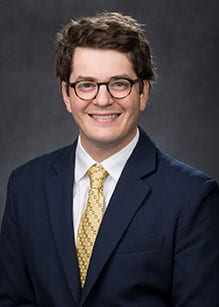SESW Social Work Faculty in the Spotlight: Dr. Robert Hasson

What brought you to PC? What made you choose it over other opportunities?
There are two important parts about PC that helped me choose PC over other opportunities. The first is the students. I first started at PC as an adjunct professor when I was finishing my dissertation. Getting to know the students before applying for a full time position was very helpful. In the classroom, I noticed how curious and engaging students are with the material, and how kind they are to each other and to me. On campus, I noticed how students remain engaged in an assortment of activities to help them deepen their interests and build community. Seeing this, I knew I wanted to be part of the community that supports students. The second important part of PC that helped me choose PC over other opportunities is the social work faculty. We are a small department, and the sense of support, collaboration, and deep sense of interest they showed one another when I first met them was extremely uplifting to me. I also soon realized that I could strengthen my teaching and research by being part of their faculty and learning from them, and saw an opportunity to share my interests with them in the hope of strengthening the department.
What motivated you to choose the profession of social work as your career?
There are a few experiences that motivated me to choose social work, and they occurred at different times in my life. My family was active in my hometown’s soup kitchen, and I started volunteering there when I was younger. That is where I first learned about individuals experiencing poverty and homelessness, and I remember wanting to help the individuals, I met at the soup kitchen. Later, as an undergraduate student, I studied abroad in India and traveled to Nepal and Tibet. During this time, I lived with and learned from Tibetan refugees, and learned about social justice and resilience. After I graduated from college, I worked for a year at a group home for adults living with severe and persistent mental illness. During that time, I met social workers and discovered how the social work profession combines my interest in clinical interventions, along with the pursuit of social justice and accompaniment with individuals and communities in need.
What is your area of research? How did you arrive at this area?
I study trauma and immigration. I am particularly interested in the experiences of children and adolescents who experience various types of trauma, including family separation and violence, in the context of the immigration system. In recent years, my work has focused on unaccompanied children who arrive to the United States from Central America, and in particular El Salvador, Guatemala, and Honduras. I think my semester abroad in India, Nepal, and Tibet had a major impact on my interest in this area. In particular, seeking to understand the challenges and consequences of migration children and families experience is important to me, particularly during a time of record numbers of displaced persons around the world.
What is it about teaching that brings you joy?
My students bring me the most joy. Joining them in the classroom, building a learning community throughout the semester, and helping create learning opportunities with them is my favorite part of my job. I enjoy the opportunity to share my expertise in social work with them, helping them identify their intellectual comfort zone, and then encouraging them to push beyond that. The students I have met in my classes are curious, engaged, and deeply committed to building skills from the social work perspective. It is such a joy to watch students learn new material, and then demonstrate mastery of the material either in written assignments or during class discussions.





